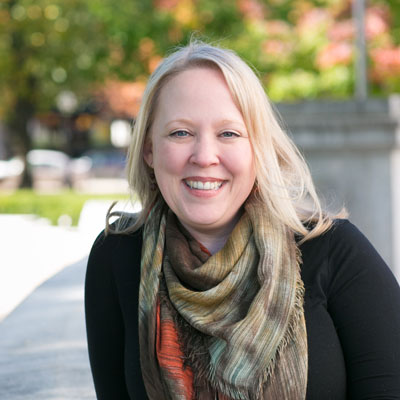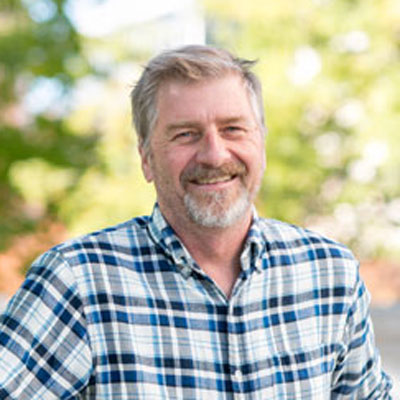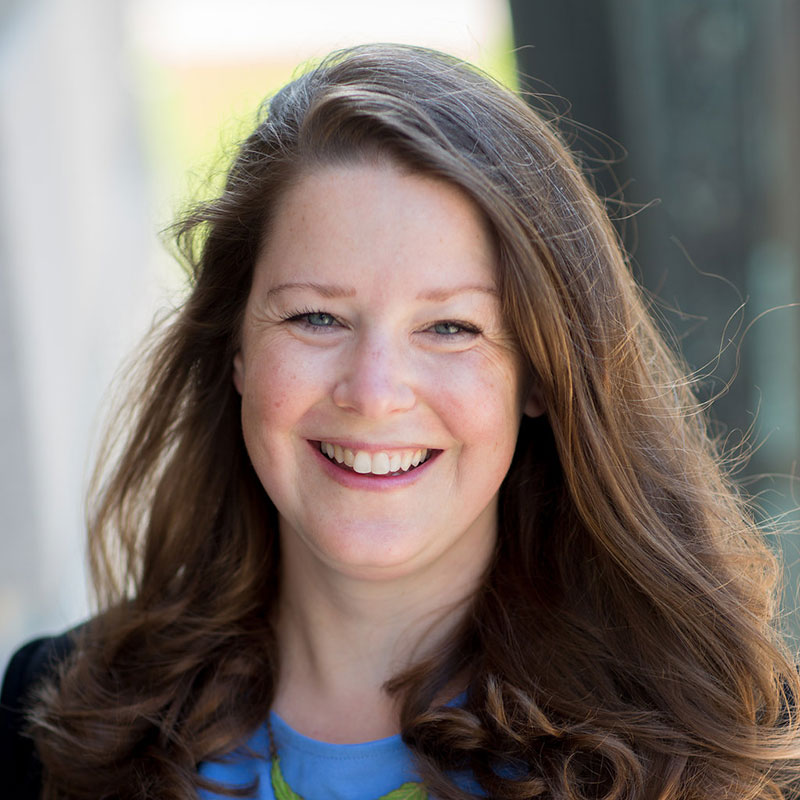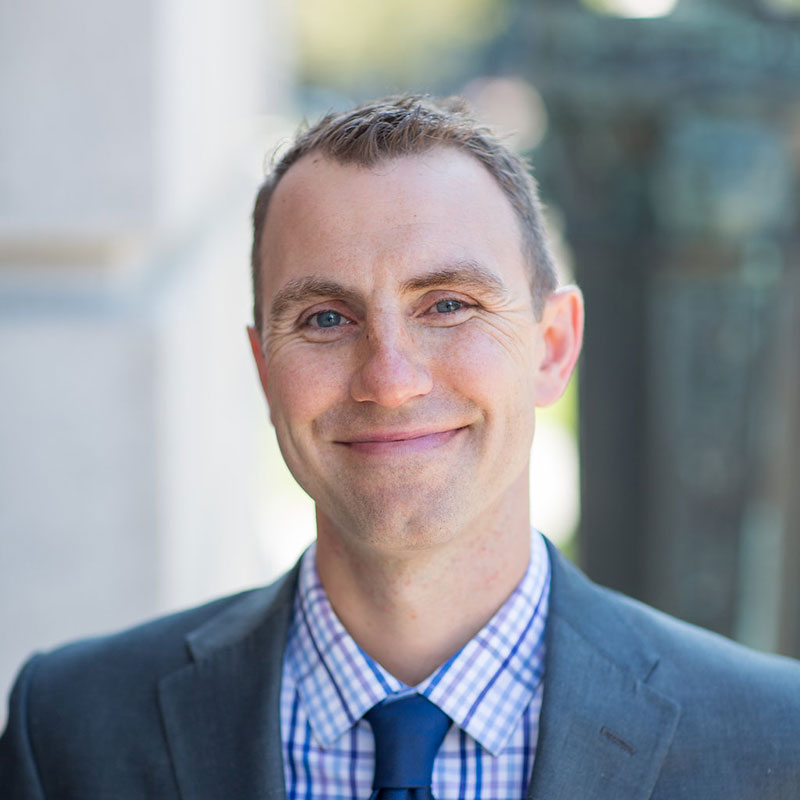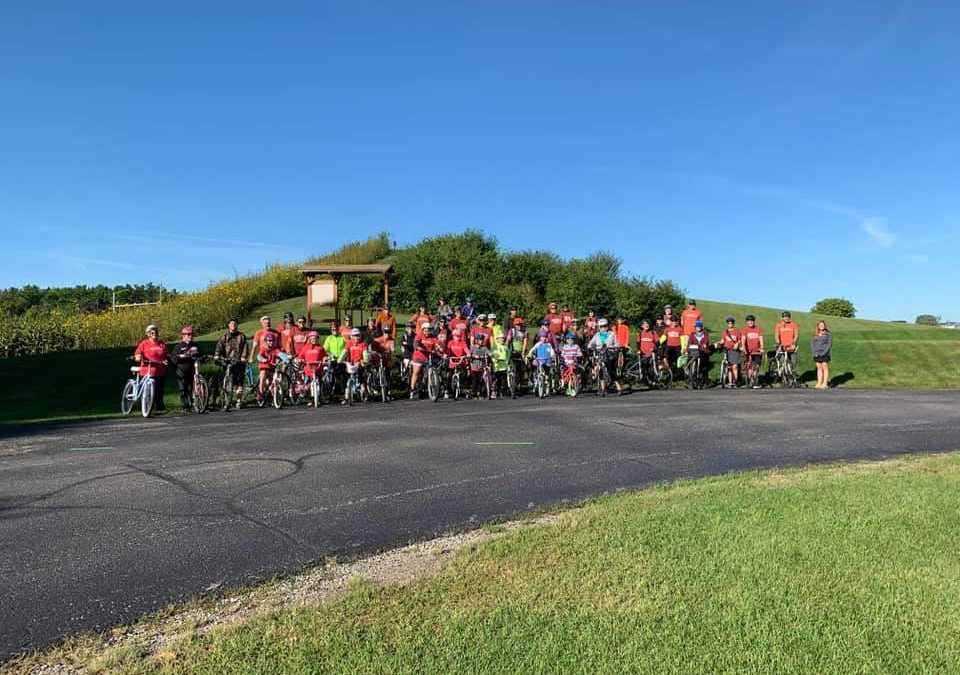
by Tyler Huebner | Sep 30, 2019 | Community, Electric Vehicles, Events, Geothermal, Hydroelectric, RENEW Wisconsin, Renewables, Solar, Wind
On Saturday, September 14th, our 7th Annual “Ride with RENEW” bike ride, held in the Fox Cities this year, was a huge success!
We started the morning at Prairie Hill Park in Grand Chute with 40 determined bike riders and 12 wonderful young ladies from the Girl Scouts of the Northwest Great Lakes! The State Representative for the area, Amanda Stuck, welcomed our riders by talking about the importance of energy, and how easy it has become to take advantage of clean energy sources.
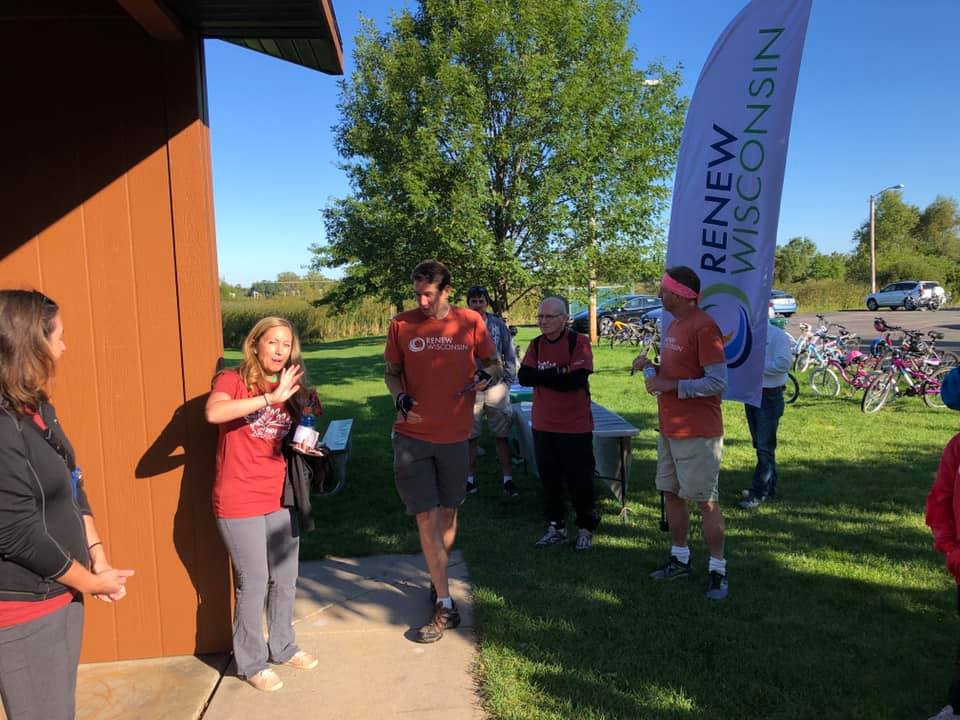
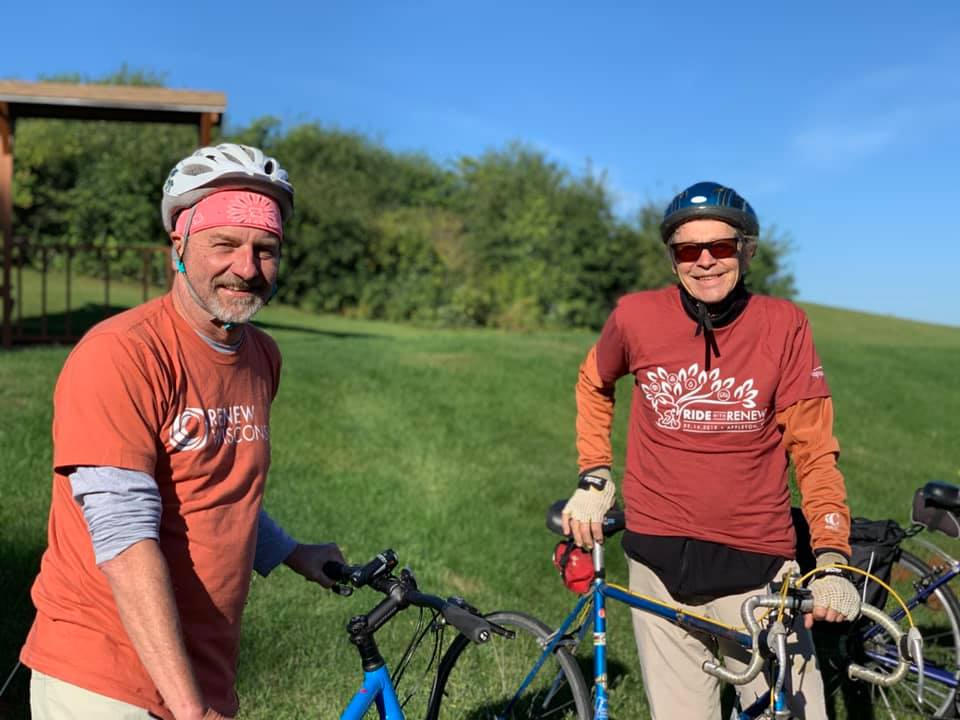
Our bike riders and Girl Scouts then set out for the Bubolz Nature Center where we explored their solar panels and microgrid, built and operated by Faith Technologies, who walked us through this one-of-a-kind facility in Wisconsin. The microgrid includes a lithium battery, a hydrogen fuel cell, and a generator, and the facility runs off the solar panels and renewable storage most of the time.
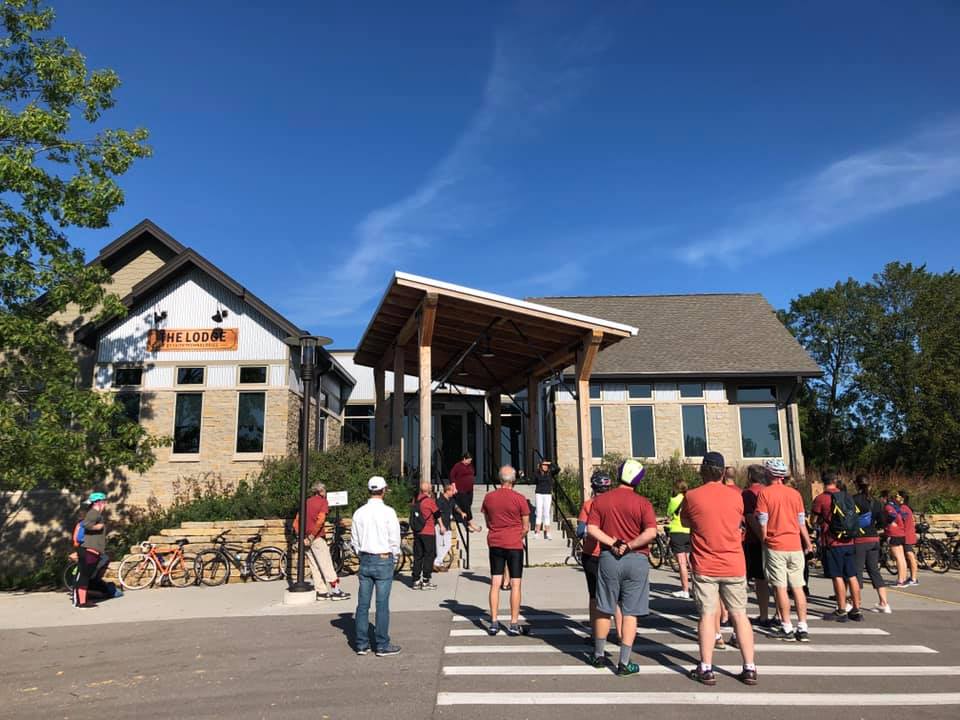
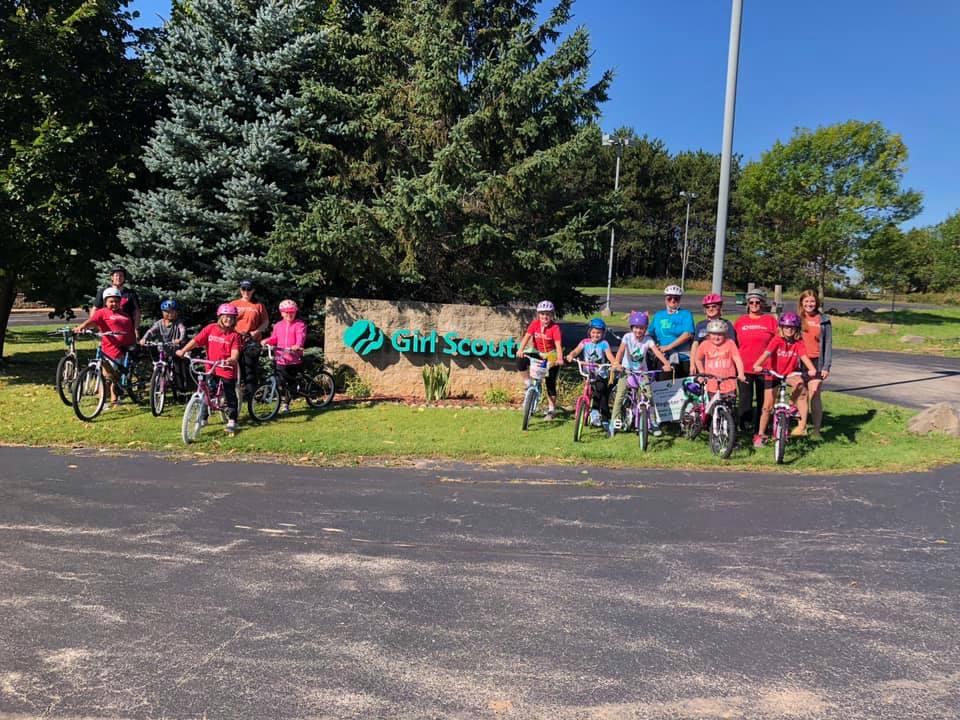
Next we biked 10 miles to Evergreen Credit Union which has become a regional leader in sustainability. With solar panels covering its roof, Roni Kasperek of Evergreen described the credit union’s migration to becoming a clean energy leader and how sustainability is a core value of the organization.
We turned Schildt Park into a clean energy mecca at lunch! Featuring pizza from Glass Nickel Pizza, we were fortunate to have the Ripon Lego League join us as they collected data from our bike riders to help them with their Lego challenge of designing a sustainable community! Our riders engaged in the Lego League’s survey, created to help the kids better understand bikers’ safety needs and how a city could better support bicycling. The Lego League kids did a great job helping to serve lunch and engage with our bikers!
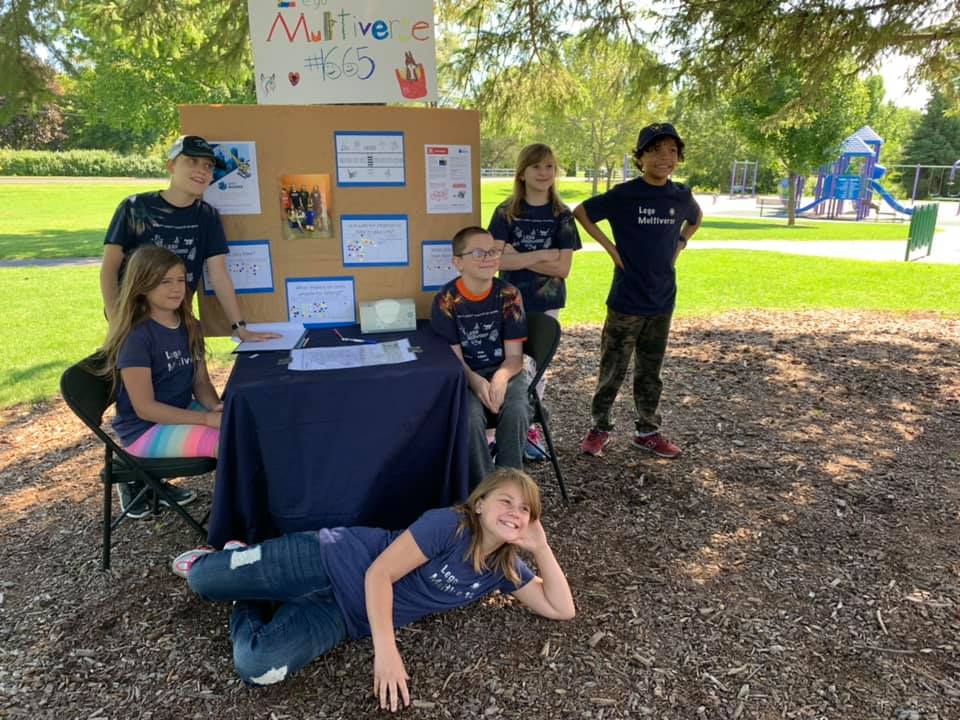
In addition, we had an electric vehicle exposition featuring 9 vehicles from 5 car brands that drive with electricity, instead of gasoline. This technology is advancing and many new types of affordable electric vehicles are coming out soon. We loved showing these cars off to our bike riders and a few members of the public, and the vehicle owners loved chatting about how much they enjoy driving electric.
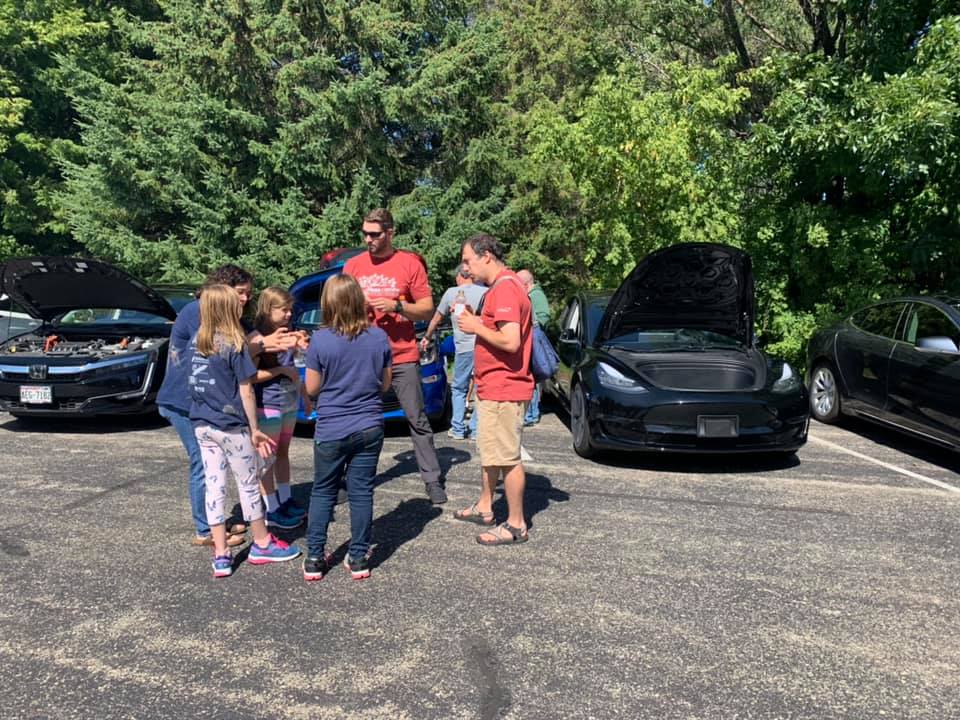
After lunch we saw small wind turbines at Essity (formerly SCA Tissue) right along the bike path. These 4 turbines were designed and installed by a former Wisconsin company called Renewegy (which is unfortunately no longer in business). Next we headed to Heckrodt Wetland Reserve in Menasha where we learned about their tremendous efforts to preserve this part of the state and how solar power is a sustainable part of their growth.
We next saw an innovative solar carport at the Petit and Dommershausen law offices in downtown Menasha, where were treated to a much-needed snack. Then we biked to RiverHeath, which is a new development in Appleton right along the Fox River. Mike Barnett of HGA described an innovative use of geothermal energy, designed by HGA and installed by G.O. Loop, that uses the temperature of the water to provide heating and cooling to the new buildings in the RiverHeath complex.
Last, but certainly not least, we biked to the first power plant in Wisconsin that delivered electricity to a customer. We were greeted by “Thomas Edison,” a generous measure provided by the Appleton Historical Society, who helped explain the origins of the Vulcan Street Hydropower Plant which was put into service in 1882 and provided electricity for lights at paper manufacturing plants as well as one home.
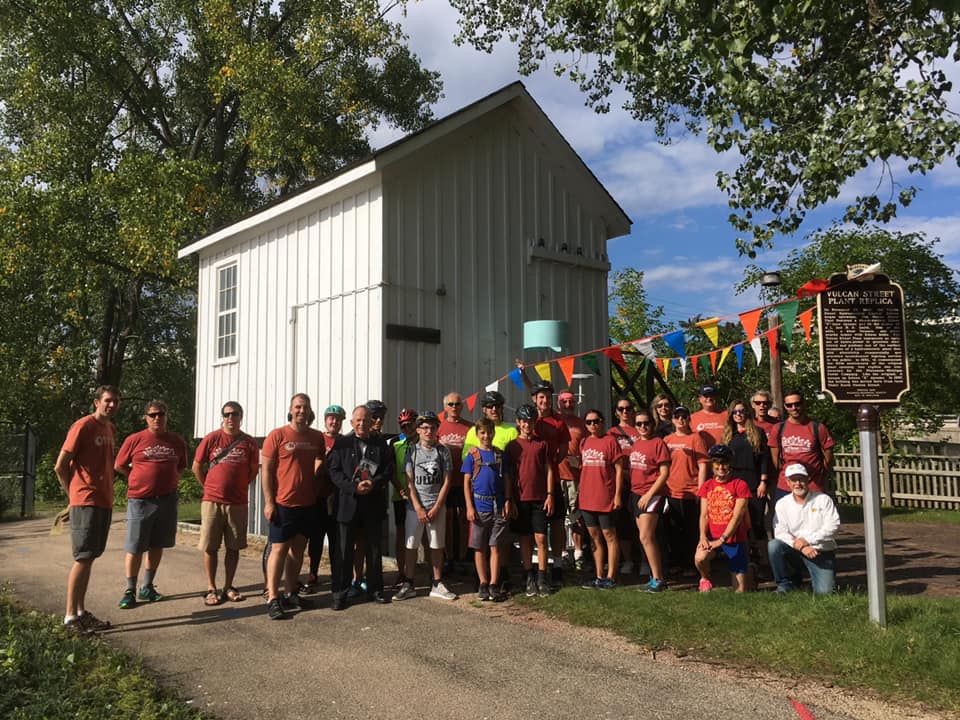
The actual Vulcan plant burned down in 1889. The Appleton Historical Society, as well as Ford Motor Company, contributed many hours and, in Ford’s case, equipment, to allow this replica of the original hydropower plant in Wisconsin to stand and to give visitors like us the opportunity to learn about Wisconsin’s energy history and see it in action.
Finally, we arrived back at Prairie Hill Park, where we enjoyed beer from Central Waters based in Amherst and celebrated a great event with our riders! The weather was outstanding, and we can’t wait to plan next year’s Ride with RENEW.
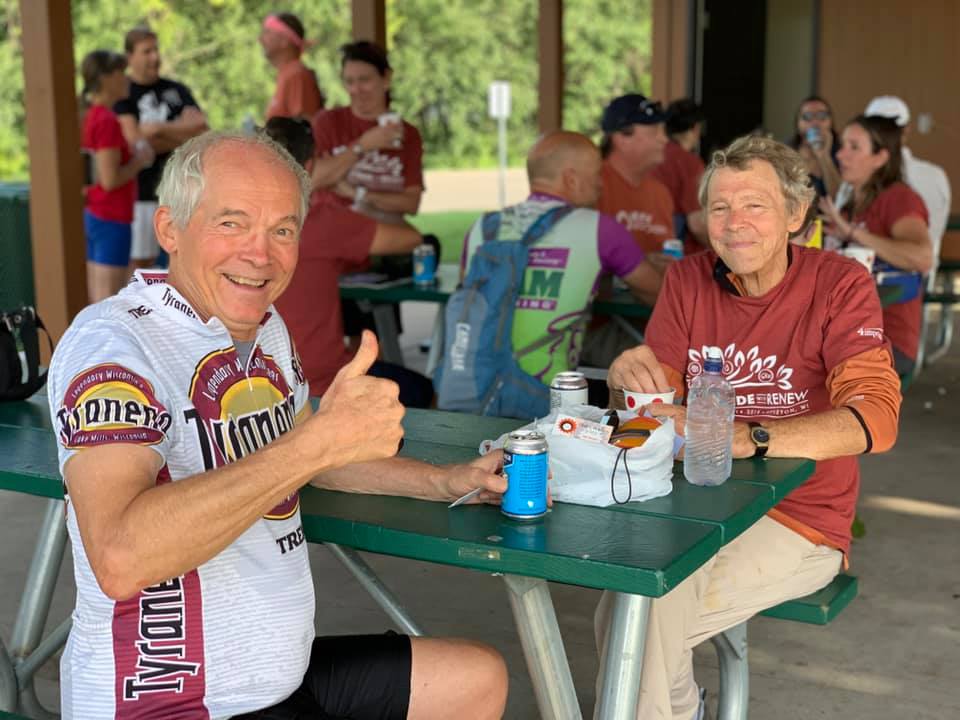
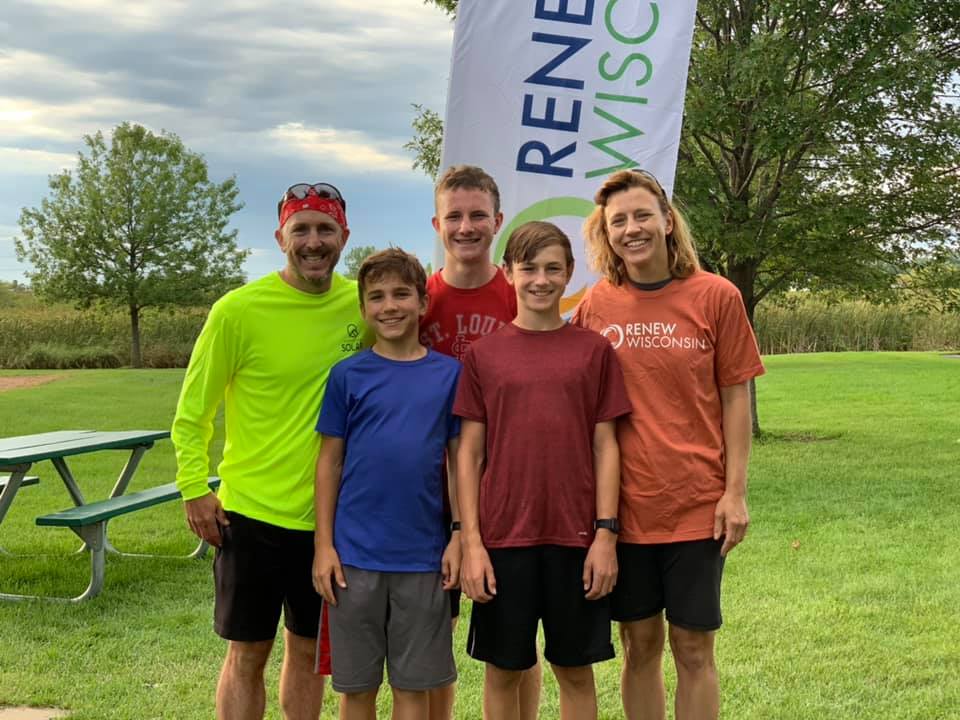
Four of RENEW staff members joined Board member Jim Funk of Energize LLC as he showed off one of Wisconsin’s earliest examples of “bi-facial” solar panels – panels that can receive light from both sides of the panel to create electricity. This installation at a carport has served as a beautiful visual example of solar energy in the Fox Cities since 2010. For example, check out the very cool design when our staff member Jim Boullion’s car was parked underneath the panels.
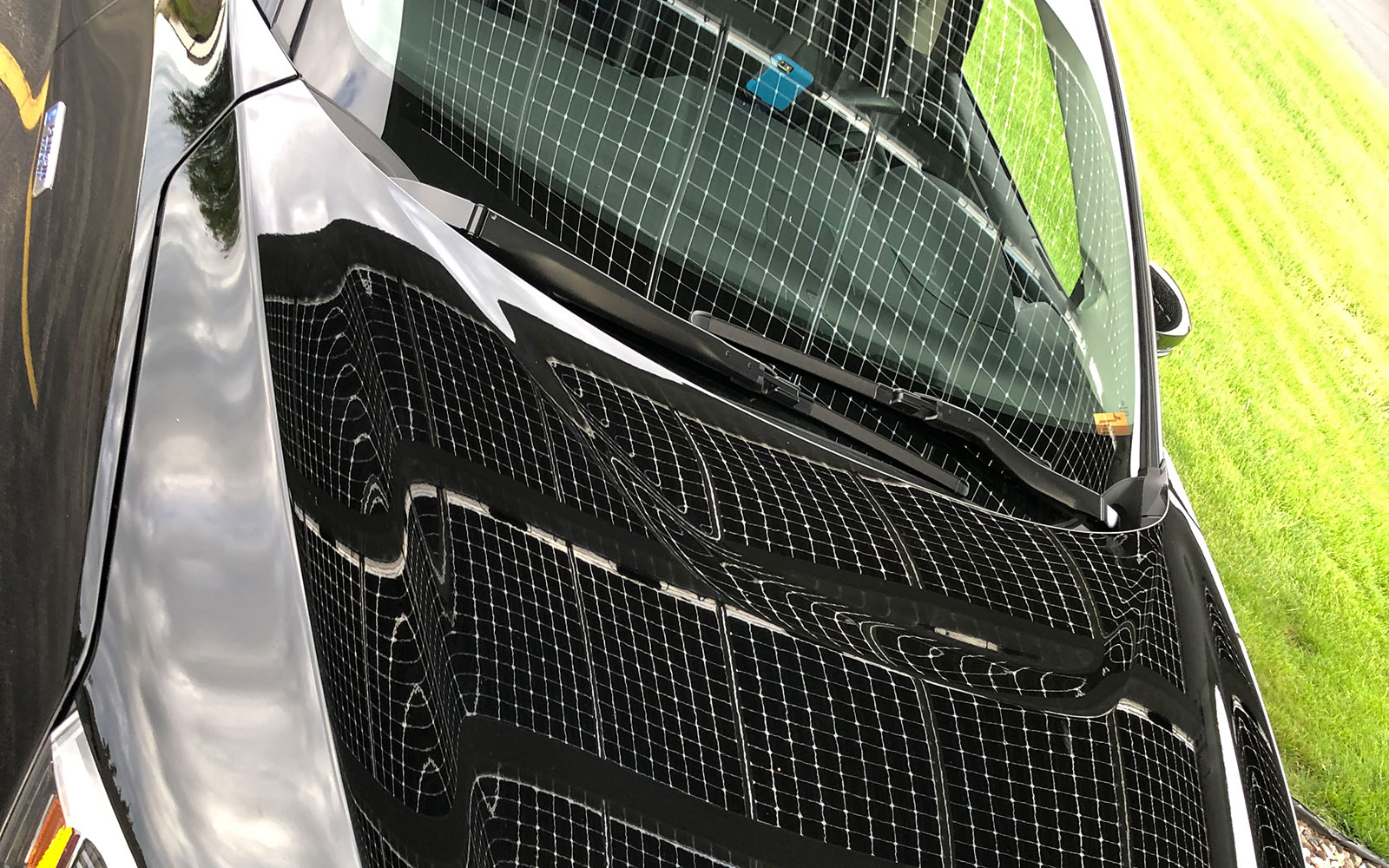
Check out our Facebook photo album to see more images of the ride!
Thank you again to all of our sponsors, shown below, all the bike riders, the Girl Scouts, Lego League, and everyone who donated to support our riders and helped us raise over $17,000 to continue our education, advocacy, and collaboration to advance renewable energy in Wisconsin!
2019 RIDE WITH RENEW SPONSORS

by Jodi Jean Amble | Sep 10, 2019 | Community, Electric Vehicles, Events, Geothermal, Hydroelectric, RENEW Wisconsin, Renewables, Solar, Solar for Good, Wind
Ride with RENEW to highlight area renewable energy projects.
On Saturday, September 14th, RENEW Wisconsin will host its 7th annual “Ride with RENEW” bicycle tour of renewable energy projects in Appleton, Grand Chute, Neenah, Menasha, and Fox Crossing, WI. All event proceeds support RENEW Wisconsin’s ongoing work to advance renewable energy in Wisconsin.
Riders will travel approximately 30 miles on paved roads and bike paths to visit solar, geothermal, wind, and hydropower energy generation facilities in the area. Riders can also participate in an electric vehicle “ride and drive” event as part of National Drive Electric Week.
Riders will depart from Prairie Hill Park at 9 AM. The total tour time will be approximately 7 hours (including stops at renewable energy sites) and actual riding time will be approximately 3 hours. Those not able or wanting to bike the ride can register as a non-biker and can use their own vehicles to transport themselves to the various tour stops.
Participants will get an inside look at some of the area’s leading renewable energy projects and will enjoy breakfast, lunch, and beverages along the way. They will visit with installers and workers who are advancing renewable energy every day, and hear from customers about why clean energy works for their businesses and communities.
The day’s tour will include stops at the following clean energy facilities:
- Gordon Bubolz Nature Preserve – The Gordon Bubolz Nature Preserve is a 700-acre facility used for recreation, conservation, and education. In July 2018, the nature preserve unveiled its new clean energy microgrid composed of solar panels, battery system, and software system.
- Evergreen Credit Union – With a mission to be the most environmentally responsible credit union in the nation, Evergreen Credit Union installed a solar array at their Appleton facility. The solar array produces enough electricity to satisfy 85% of the credit union’s annual electricity demand.
- Electric Vehicle Ride and Drive at Schildt Park (Neenah) – As part of National Drive Electric Week, join RENEW Wisconsin and many Fox Valley sustainable businesses to learn about and test drive electric vehicles and electric bicycles. The event will overlap with Ride with RENEW’s lunch hour.
- Essity Wind Turbines – Essity is a global company that manufactures hygiene and health products. In 2007, Essity installed a 20 kW solar PV system, and in 2010, Essity installed four wind turbines that generate 80 kW of energy.
- Heckrodt Nature Preserve – Heckrodt Wetland Reserve, a Solar for Good grant recipient, is a 76-acre urban nature reserve. In 2018, Heckrodt installed a 19.6 kilowatt solar panel system to offset 5,000 pounds of CO2 emissions.
- Petit & Dommershausen, SC Law Offices – The Petit & Dommershausen Law Offices have embraced solar energy at their Menasha and Oshkosh locations. After installing a 20.7 kW solar carport array at their Menasha location in the fall of 2017, Petit & Dommershausen is offsetting approximately 81% of their Menasha office’s annual electricity usage.
- RiverHeath – RiverHeath Community is a vibrant apartment and retail area that was redeveloped from an urban brownfield site on the Fox River. Buildings utilize an innovative river based geothermal heating and cooling system that minimizes the site’s energy use and carbon intensity while reducing first costs compared to a conventional ground source geothermal system.
- Vulcan Street Plant – The Vulcan Street Hydroelectric Central Station, the world’s first Edison hydroelectric central station, began operation in 1882 in Appleton. The output of the original generator was about 12.5 kilowatts. In 1891, the plant burned down, and a replica of the plant was later built on South Oneida Street.
- Schmidt Brothers Solar Canopy (add-on stop for non-bikers) – This 20kW Bi-Facial Solar Cantilevered Parking Canopy benefits from added generation from reflection below when snow covers the lot and when white or other light-colored vehicles park beneath it. The cantilevered design was specifically implemented to provide open and clear access to all parking spaces.
- The ride will conclude at Prairie Hill Park for refreshments at around 4:00 p.m.
Registration for the ride is open through September 14th. The cost is $45 for members of RENEW Wisconsin, $55 for non-members, and $75 to both register for the ride and become a member of the organization for one year. All donations to RENEW Wisconsin for this charity bike ride are matched up to $15,000 by generous donors John & Mary Frantz of Madison!
Individuals and businesses can donate to RENEW Wisconsin or in support of a rider, donate to RENEW to contribute towards a $15,000 matching donation, or volunteer on ride day.
“We are very excited to tour some of the Fox Cities’ great renewable energy projects on Saturday, September 14th,” said Tyler Huebner, Executive Director of RENEW Wisconsin. “This tour allows us to showcase a variety of ways to produce homegrown, clean energy right here in Wisconsin and for our team to engage with renewable energy advocates in the Appleton area. We’ll be learning about wind, solar, geothermal, and a hydropower plant that is part of renewable energy history as being the first electric production in Wisconsin. This is a really fun event where you can meet great people, help a good cause, and learn together about clean energy in Wisconsin.”
Sponsors of the Event include Eland Electric, Energize LLC, HGA, North Wind Renewable Energy Cooperative, Appleton Solar, Arch Electric, Clean Fuel Partners, G.O. Loop, Petit & Dommershausen, SC Law Offices, RiverHeath, Velocity, Wegner CPAs, 4imprint, Central Waters Brewing Company, Chain Reaction Cyclery, Glass Nickel Pizza Co., and Sturdy Bag Designs.
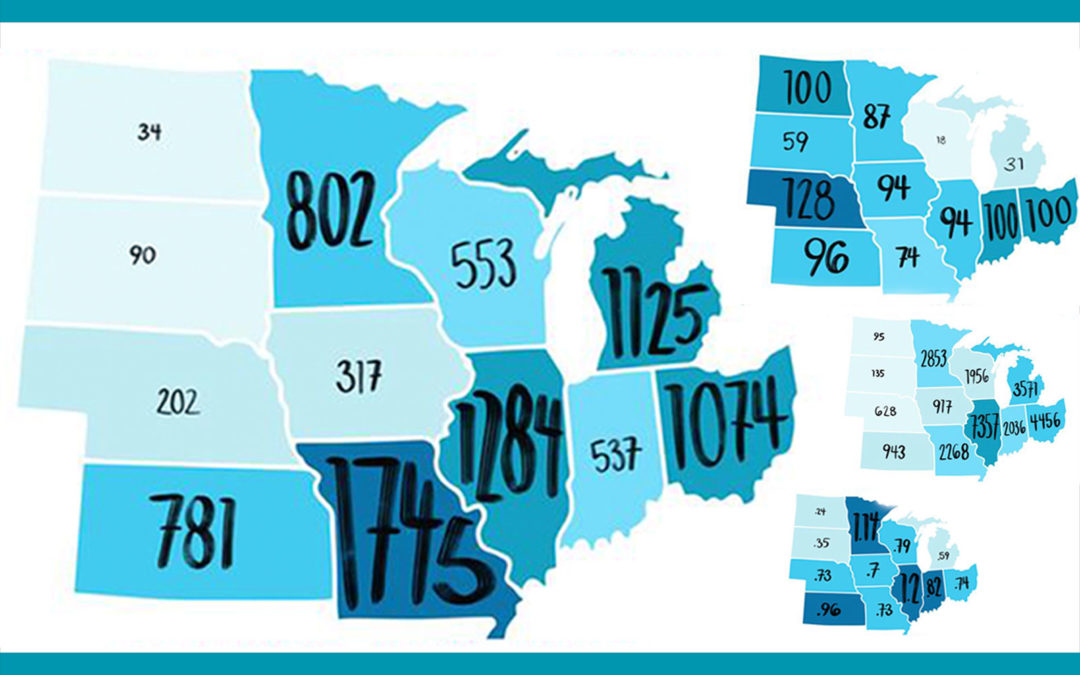
by Jane McCurry | Jul 31, 2019 | Electric Vehicles
I’ve been following the NRDC Fellows’ EV road trip across the Midwest. They drove, they charged, and they wrote about it. This particular blog post, about the Midwest electric vehicle market, caught my eye. At first, maybe it was due to the colorful maps, but I found an underlying message for Wisconsin in this post: Keep the ball rolling.
There is so much potential for Wisconsin to be a leader in the electric vehicle market, and these statistics prove it. With hardly any pro-electric vehicle policy, Wisconsin is keeping up with states like Minnesota and Michigan. Think about what we could do if we keep the ball rolling! Recent wins like the Volkswagen Settlement Funding signal a bright future for Wisconsin’s electric vehicle market.
Enjoy!
July 02, 2019
Ada Statler Jessica Russo Madhur Boloor Patricia Valderrama Samuel Garcia
This is the sixth blog in a series about our Midwest electric vehicle adventure.
We’ve written about electric vehicle (EV) policies and pilot programs in the Midwest, as well as sub-trends we’ve seen along our 1,300+ mile electric road trip route. But it can also be helpful to see where the numbers stand overall. These maps look state by state at EV sales numbers, market shares, growth, charging infrastructure, and related jobs. Notably, the places where we’re seeing the most EV-related activity (darker blues in the map) are also generally where we’ve seen the introduction of more EV-friendly policies.
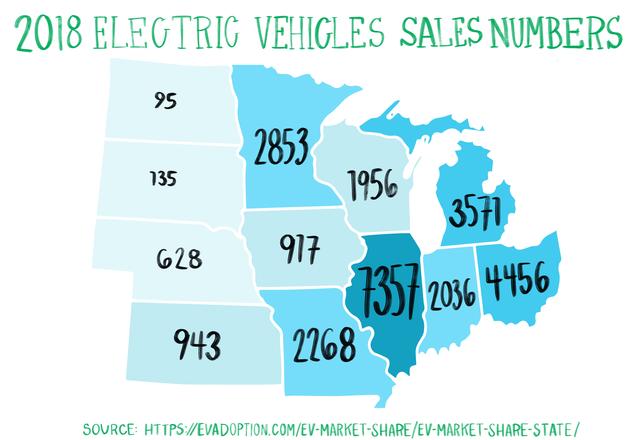
Looking at the number of new EVs bought in a state can seem like the most straightforward way to understand how many clean cars are on the road there. But without taking population and car ownership numbers overall into account, it is hard to really get a sense of where EVs are taking off and where they still need encouragement.
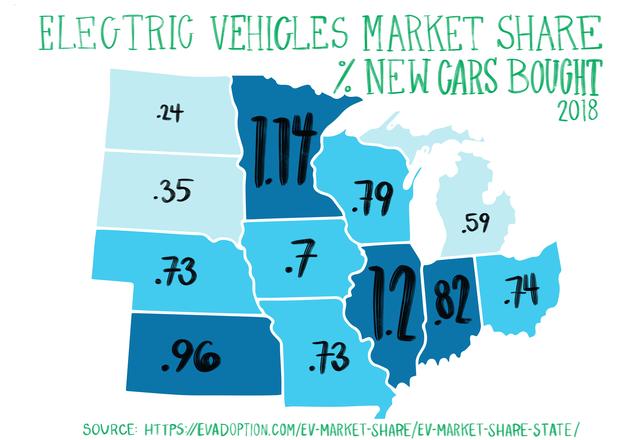
Looking at EV purchases as a percent of market share within each state is a bit more helpful as it allows you to consider how big of a presence EV sales are in the state’s market. For perspective, the highest EV penetration is in states like California, where the 7.84 percent EV market share of new vehicles bought in the state in 2018 represents 46.8% of national EV sales that year—likely due to Zero Emissions Vehicles (ZEV) Standards that require automakers to stock EVs in-state. The ZEV standard goal is 2.5 percent market share for EVs by 2025 and 8 percent market share by 2030. No Midwestern states have joined the coalition of states with ZEV standards. Nevertheless, Illinois and Minnesota lead the region with 1.2 and 1.14 percent EV market shares respectively. (It’s no coincidence that both these states also have a relatively high number of public chargers, and that Minnesota has been moving forward with utility charging programs.) Policies like ZEV standards could go a long way toward reducing barriers to EV access in this region and expanding consumer choice.
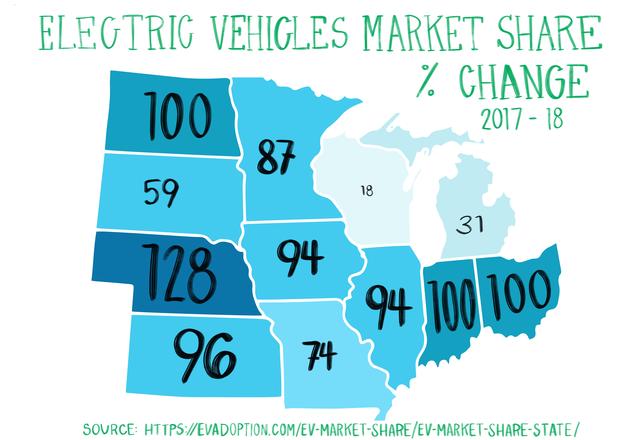
It might still be hard to get a sense of EV growth without looking at how the market share changes from year to year. The short of it: quickly! This map shows the change in EV market share over one year. Notably, some states, like Illinois, have grown faster (as a percent change) in the past, while others, like Nebraska, are just starting to see more growth and thus appear to have greater growth.
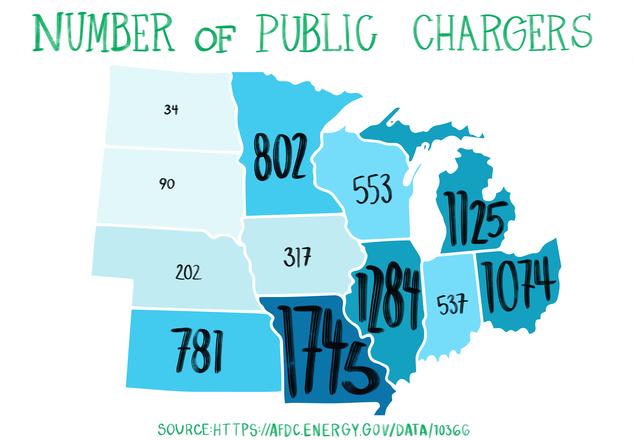
Increasing the number of public charging stations is essential in order to enable longer-distance travel in electric vehicles and ownership options for roadtrippers, and for those who may not be able to charge an EV at home. This data source looks at number of plugs as opposed to stations because there may be anywhere from one to eight plugs at a single charging station. Both the total plug count and the total station count are important: we don’t want any EVs to have to wait in line to charge, but we also want to make sure that stations have a useful geographic spread.
It’s important to note that these ports are not evenly distributed throughout the state. Most are concentrated in larger cities, with a few along major highways. In our experience, there are certainly spots where more could be useful. For instance, even in Missouri, which has the largest number of absolute charging ports in the region, it would have been very difficult for us to travel in our Chevy Bolt (a longer range non-Tesla EV) between the state’s two largest cities, St. Louis and Kansas City. This is just one example of the need for more strategically distributed chargers.
Thanks to the NRDC team for allowing us to share their blog. Check out other blogs from the NRDC Fellows Road Trip here.
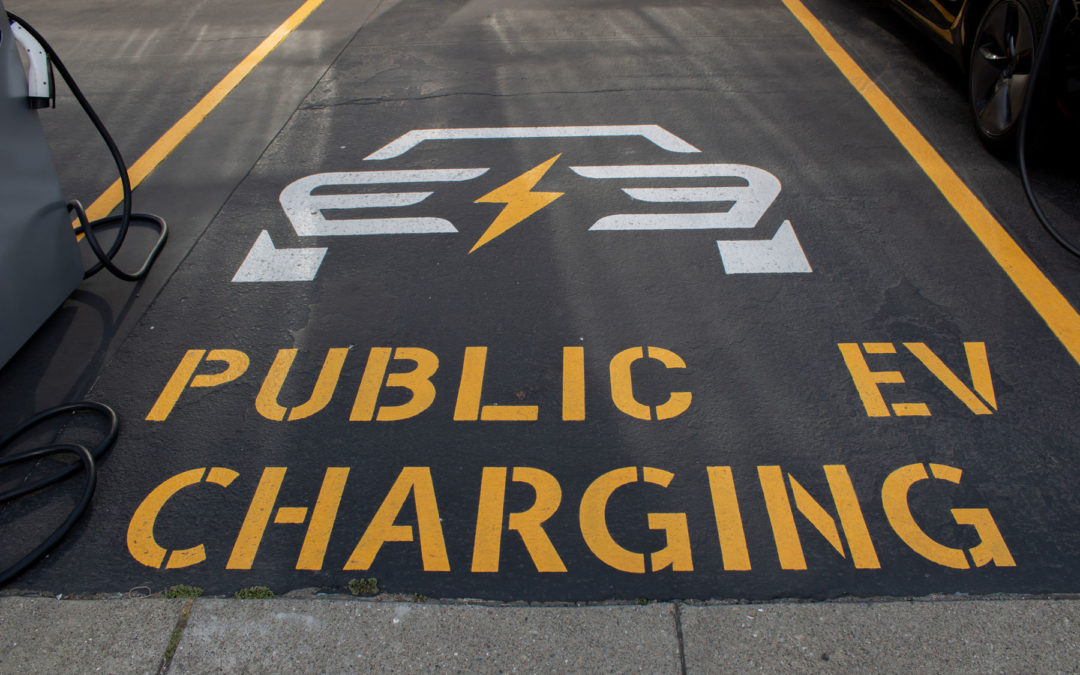
by Jane McCurry | Jul 3, 2019 | Electric Vehicles
Wisconsin has secured Volkswagen Settlement funding for electric vehicle charging stations!
Governor Evers signed the State Budget today, with 78 partial vetoes. One of those vetoes was used to edit the section designating Volkswagen Settlement funding. In the signed budget, up to $10 million can be used for electric vehicle charging stations.
Over the next two years, Wisconsin is expected to receive $25 million in Volkswagen settlement funding. Evers’ veto reinstates his original proposal which allocates $15 million to replace public buses and up to $10 million for electric vehicle charging stations.
Together, we sent 443 letters to legislators telling them that electric vehicle charging stations are important for advancing clean energy in Wisconsin. Thank you for your support in making this issue heard!
Now, Wisconsin will join the 45 other states taking advantage of this huge opportunity to kickstart the fast-growing electric market. We are eager to see the future of clean transportation in Wisconsin, and believe this funding will go a long way toward making electric vehicles accessible for all Wisconsinites.
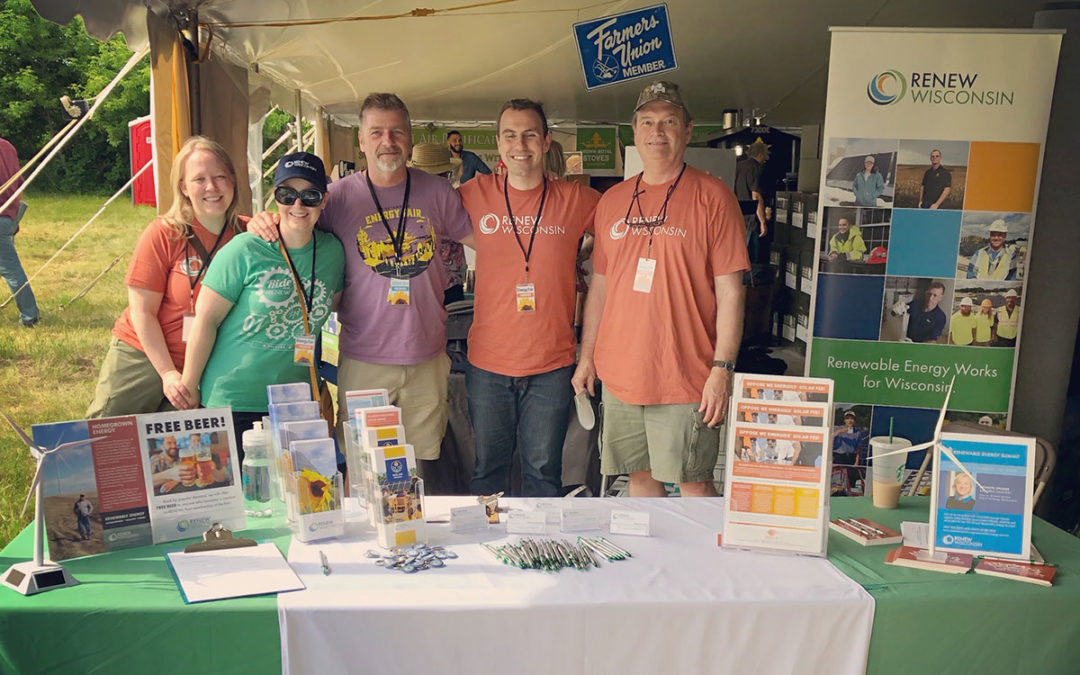
by Jodi Jean Amble | Jun 28, 2019 | Electric Vehicles, Events, Local Government, Programs, RENEW Wisconsin, Renewables, Solar, Solar for Good
Last weekend, the MREA Energy Fair brought people together to learn about clean energy and sustainability, connect with others, and take action towards a sustainable future. The Fair featured workshops, exhibitors, live music, inspiring keynote speakers, family fun, great local food, and more. The Energy Fair is the longest-running event of its kind in the nation and RENEW Wisconsin was excited to be a part of it!
RENEW staff presented some compelling workshops and you can download slides from their presentations below.
Clean Energy Communications
Jodi Jean Amble, RENEW’s Communications Director, presented a workshop on clean energy communications. She discussed 6 tenets of creating effective communications messages, shared insights from clean energy communications polling, and showcased some of RENEW’s recent campaigns.
Community-Led Clean Energy Action
Michael Vickerman, RENEW’s Policy Director, presented a workshop focused on communities across Wisconsin that are taking action to advance renewable energy in meaningful ways. Michael’s presentation surveys the specific action steps taken by individual municipalities to procure new supplies of solar energy and integrate carbon reduction goals into their own operations, including local transit options.
Solar Farms – Economic and Agricultural Benefits
Heather Allen, RENEW’s Program Director, presented a workshop on solar farms featuring Bob Bishop, a local farmer from Iowa County renting his land out for the 300 Megawatt Badger Hollow Solar Farm. They talked about the economic, environmental and agricultural benefits of solar farms for rural communities. This workshop explored how to address frequently asked questions including those related to land use, food production, visual changes, and community values.
Solar for Good – Helping Wisconsin Nonprofits
Sam Dunaiski, RENEW’s Program Manager, presented information on the Solar for Good program including how the program got started and how it assists nonprofits in going solar. The workshop also featured a panel of nonprofits and solar installers that participated in the program. Panelists were Joe Lenarz (Pleasant Ridge Waldorf School), Kelsey Parry (Heckrodt Wetland Preserve), Angie Kochanski (Arch Electric), and Doug Stingle (North Wind Renewable Energy).
Electric Vehicle Toolkit
Jane McCurry, RENEW’s Program Manager focusing on electric vehicles, presented a workshop for people interested in seeing EV adoption advance in the Midwest. The discussion included charging infrastructure, influencing policy, the benefits of driving electric, and why EVs are good for the community, state, and country.
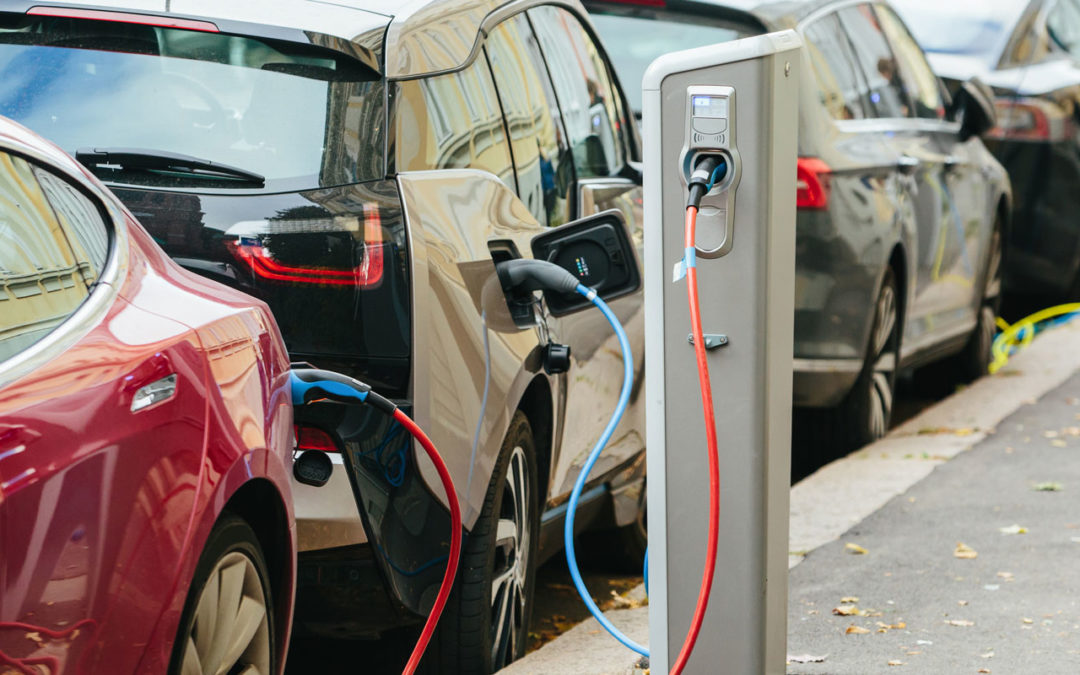
by Jane McCurry | May 31, 2019 | Electric Vehicles
On May 28th the Assembly Energy and Utilities Committee held a hearing on Assembly Bill 233. The bill would allocate a little over $10 million of the Volkswagen Settlement money to fund electric vehicle charging stations in Wisconsin.
RENEW Wisconsin, Customers First! and Wisconsin Conservative Energy Forum all spoke in favor of the goal of the bill. We stressed the importance of preparing Wisconsin for the coming transition to electric vehicles, and, with our allies, made the case for using Volkswagen Settlement Funding to do so. A number of other groups testified with concerns about specific provisions that they believe need to be changed.
Representative Adam Neylon (R-Pewaukee) and Senator Robert Cowles (R-Green Bay) are the lead authors of the bill. They both agreed that the legislation needs some work but they are committed to adjusting the proposal to ensure it best serves the mission of the bill, which is to increase access to electric vehicle charging in Wisconsin.
This legislation is similar to a proposal that Governor Tony Evers put into his budget bill. RENEW is working with stakeholders and elected officials to address the details of the bill and bolster support for using $10 million of the VW Funding for electric vehicle infrastructure.
In our testimony below, we highlighted the benefits of electric vehicles, the need for fast-charging stations, and our concerns with AB 233 that we feel need to be fixed for this legislation to be passed or for it to be included in the budget bill.
There is still time to get involved! Please reach out to your legislators to support AB 233 and Governor Evers budget proposal.
For more information on the background of the Volkswagen Settlement, see previous Electric Vehicle Blogs: Volkswagen Settlement Update and “The Volkswagen Settlement” – A Big Opportunity for Electric Vehicles.
Assembly Bill 233 – Clean Energy Corridor Grants
Testimony before the Assembly Energy and Utilities Committee
Tuesday, May 28, 2019
Jim Boullion, Director of Government Affairs
Jane McCurry, Electric Vehicles Program Manager
Jim Boullion: Chairman Kuglitsch and committee members, thank you for the opportunity to speak to you today. My name is Jim Boullion, Director of Government Affairs for RENEW Wisconsin. With me, and also from RENEW Wisconsin, is Electric Vehicles Program Manager Jane McCurry.
RENEW Wisconsin is a nonprofit organization founded in 1991 that promotes all forms of renewable energy in Wisconsin. We work on policies and programs that support solar, wind, biogas, geothermal energy and electric vehicles.
RENEW Wisconsin supports AB 233 and its goal of expanding the availability of electric vehicle charging stations in Wisconsin.
I would like to turn it over to Jane McCurry to share information with you about the market for electric vehicles, details of the Volkswagen Settlement and why this legislation is needed.
Jane McCurry: The market for electric vehicles is changing fast. The upfront price of an electric car is dropping, and is expected to reach parity with internal combustion engine cars by the mid-2020s. Every major auto manufacturer has pledged to overhaul their vehicle offerings. We expect almost 200 new electric vehicle models to be available in the next few years, from SUVs to pickup trucks and sedans.
While most electric vehicle charging is done at home, public charging stations are needed for citizens who live in multifamily buildings, who travel long distances for work, and to support our robust tourism sector. Currently, Wisconsin only has 32 fast charging locations, most of which are densely located in the Madison and Milwaukee areas. In order to make driving electric accessible for everyone in Wisconsin, we need to build a network of fast rechargers that will allow both urban and rural Wisconsinites to drive electric with confidence.
The Federal Volkswagen Settlement, where the money for this bill originates, specifies that the funding can only be used for certain purposes. The Settlement authorizes using up to 15% of the funds for zero emission vehicle infrastructure. As of today, 45 states have opted to use part or all of their available zero emission vehicle infrastructure funding to build out the electric vehicle infrastructure in their state. Wisconsin is one of only 4 states that has submitted a plan for using Volkswagen Funds that did not take advantage of this opportunity.
In the Midwest, there is consensus that we need to act now. Illinois, Indiana, Iowa, Michigan, Minnesota, and Ohio are all using the available Volkswagen funding for charging station infrastructure. Each of our Midwest neighbors have slightly different programs for utilizing the funding, however, the consensus very much reflects AB 233’s plan to prioritize fast charging along major highway corridors.
Because 85% of Wisconsin’s Volkswagen funds must be used for retrofitting or replacing diesel vehicles, we strongly support using the remaining 15% to create a permanent network of high-speed public charging stations, which would give people and businesses the confidence they need to buy hundreds of thousands of electric vehicles in the coming years.
We believe that investing this 15% of the funds in charging stations is by far the best use Wisconsin’s Volkswagen Settlement funding. It is a long-term investment in a critical technology that will last for decades and will benefit everyone in our State.
I will now turn it back over to Jim to make our comments on the specifics of AB 233.
Jim Boullion: The coming increase in electric vehicles on the road is such an important issue that the Wisconsin Public Service Commission recently started an informational docket on the subject. The information collected in that docket may provide valuable information to the Legislature in finding workable solutions to some of the issues identified in this bill.
As to a few of the individual items in the bill, we have the following comments:
- 20% to the transportation fund: RENEW does not object to EVs and EV charging stations paying their fair share to support road construction. However, including a provision on road funding in this particular grant program presents some problems:
- This would create a tax on charging stations that receive grant money but not on other charging stations. This will be anti-competitive and difficult to implement.
- Instead of establishing a 20% tax, we would recommend including in the legislation a directive to the PSC asking them to make a recommendation on the best method for public vehicle charging stations to contribute to the road fund.
- Time of use fees: As currently written, Grant recipients may only charge a parking fee based on the length of time at the charger and not on the amount of electricity consumed.
- For a level 2 charger this is not an issue because the flow of energy can be almost equally received by all models of electric vehicles. On a DC fast charger, however, a Chevrolet Bolt can accept only 50 kW of power, but a Tesla Model 3 can accept 125 kW. So, if both cars were plugged in for the same period of time, the Model 3’s battery would be filled with 2 and a half times more electricity.
- The inequity of getting less power for the same amount of money on a per minute system is a problem. To address it, at least 21 states have allowed financially charging by the electron specifically for electric vehicle charging stations without violating public utility laws.
- This is an issue that the PSC has included in their EV docket and they will likely make a recommendation on how this should be handled.
- Grants may not exceed 50% of the cost to purchase and install a charging facility:
- We agree that grantees need to have “skin in the game,” but the 50% limit may reduce the number of DC fast charging stations that will be deployed using these funds. For example, Pennsylvania allocated $1 million in funding, not part of the Volkswagen Settlement, for 50% matching grants. Their fund did not get any applications until they increased the percentage. Especially in more rural areas of Wisconsin, we may need more than 50% of matching funds to incentivize the installation of fast chargers.
- We would recommend limiting the grants for level 2 chargers to 50% and allowing grants for DC Fast Chargers up to 75%. Allow the PSC to determine through their application criteria what proposals best serve the State’s goals.
Wisconsin’s plan to use $10,065,000, the full 15% of our allotted settlement funding, will go a long way toward ensuring Wisconsin will not fall behind in the transition to electric transportation. These charging stations will kickstart a whole new market of transportation that will benefit our State and local economies for decades to come. This is an opportunity to ensure all Wisconsin citizens have access to electric vehicles.
Not only that, but electric vehicles provide an opportunity to fuel our transportation with clean, homegrown energy that is produced right here in Wisconsin. Wisconsin spends $8.2 billion each year on fuel for transportation that comes from out-of-state. The program created by AB 233 will bolster our local energy production and local economies for decades to come.
Thank you for the opportunity to speak to you today. We are very excited to see your leadership investing in the transition to clean, high-tech transportation.




















